Daily Vocabulary Words: List of Daily Used Words in Leading International Newspapers
Hi there. Welcome to this special section @ Wordpandit.
Our endeavour here is very simple: to highlight important daily vocabulary words, which you would come across in leading newspapers in the country. We have included the following newspapers in our selection:
• The New York Times
• The Washington Post
• Scientific American
• BBC
• The Guardian
• Psychology Today
• Wall Street Journal
• The Economist
We are putting in extensive work for developing your vocabulary. All you have got to do is be regular with this section and check out this post on a daily basis. This is your repository of words that are commonly used and essentially, we are posting a list of daily used words. Hence, this has significant practical application as it teaches you words that are used commonly in leading publications mentioned above.
Visit the website daily to learn words from leading international newspapers.
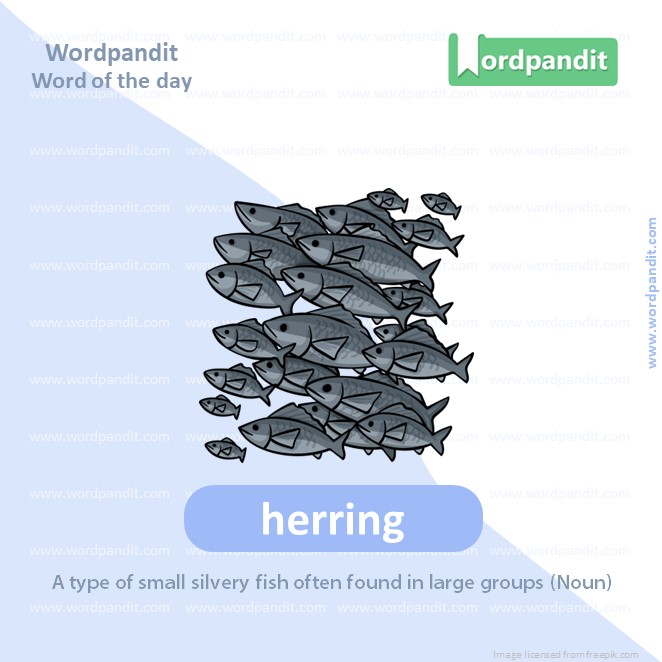
WORD-1: Herring
CONTEXT: The recent panic about a measles revival in the global north is a bit of a red herring for him.
SOURCE: New York Times
EXPLANATORY PARAGRAPH: Imagine tiny fish swimming together in a big group. Herring is a special kind of fish that likes to swim in groups. It’s like having lots of fish friends all swimming together in the ocean.
MEANING: A type of small silvery fish often found in large groups (Noun).
PRONUNCIATION: HEH-ring
SYNONYMS: None (specific to the type of fish).
USAGE EXAMPLES:
– The fishermen caught a haul of herring for dinner.
– Seagulls circled above, hoping to catch the glint of the herring in the water.
– The aquarium had a tank dedicated to showcasing the beauty of herring.
WORD-2: Excoriated
CONTEXT: Even in feudal times, he would have been excoriated for that crime.
SOURCE: New York Times
EXPLANATORY PARAGRAPH: Think about when you accidentally scratch your skin and it hurts. When something is excoriated, it means it’s criticized or scolded really strongly, like when you get in trouble for doing something wrong.
MEANING: Criticized or scolded severely (Verb).
PRONUNCIATION: ik-SKOH-ree-ayt-ed
SYNONYMS: Berated, Castigated, Rebuked, Condemned, Censured, Reproved, Lambasted.
USAGE EXAMPLES:
– The boss excoriated the employee for making the same mistake again.
– The movie was excoriated by the critics for its poor plot.
– She excoriated herself for forgetting an important task.
– The teacher excoriated the students for their disruptive behavior.
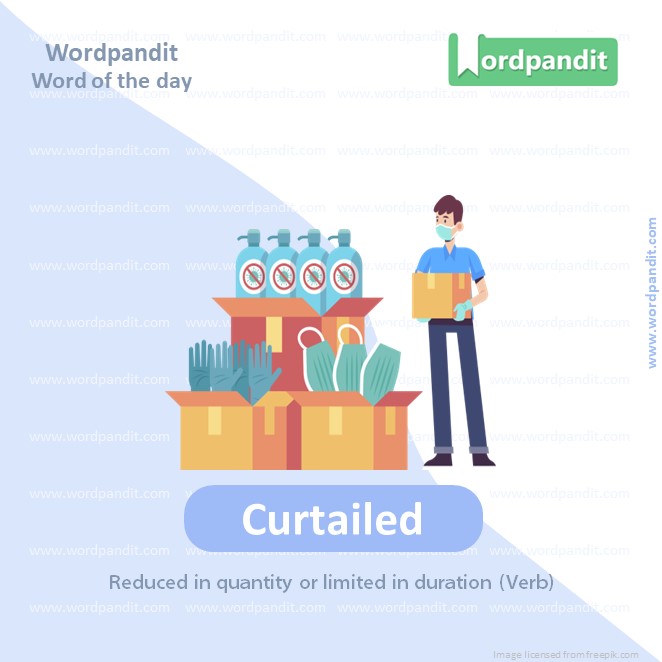
WORD-3: Curtailed
CONTEXT: e notes her life was “destroyed” by the attack, but he spends much more time detailing Bill’s life (and short jail time curtailed in part because he kept being attacked by other inmates for his crime.
SOURCE: New York Times
EXPLANATORY PARAGRAPH: Imagine having a big bag of candy, but you’re told you can only have a little bit. When something is curtailed, it means it’s reduced or limited, like when your playtime is shortened.
MEANING: Reduced in quantity or limited in duration (Verb).
PRONUNCIATION: kur-TAYLD
SYNONYMS: Restricted, Limited, Trimmed, Cut back, Diminished, Restrained, Scaled down.
USAGE EXAMPLES:
– Due to the storm, outdoor activities were curtailed for safety.
– The budget cuts curtailed the number of projects the company could undertake.
– The teacher curtailed the length of the assignment to give students more time.
– The event had to be curtailed because of unexpected logistical issues.
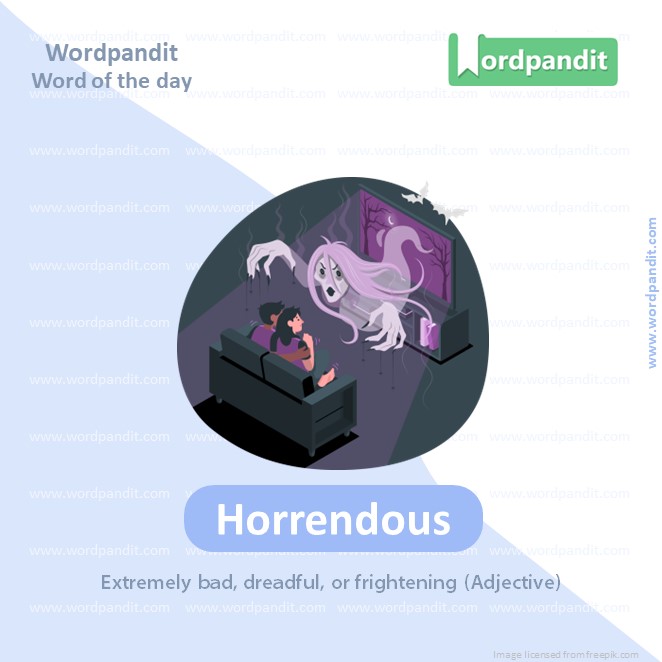
WORD-4: Horrendous
CONTEXT: There is no information about any attempt on Bill’s part to make restoration for his horrendous violence.
SOURCE: New York Times
EXPLANATORY PARAGRAPH: Imagine something really, really scary or terrible, like a monster in a movie. When something is horrendous, it means it’s extremely bad or frightening, like the scariest dream you can imagine.
MEANING: Extremely bad, dreadful, or frightening (Adjective).
PRONUNCIATION: ho-REN-dus
SYNONYMS: Terrible, Awful, Dreadful, Frightening, Appalling, Gruesome, Shocking.
USAGE EXAMPLES:
– The car accident was horrendous, but thankfully everyone survived.
– The news reported a horrendous crime that shocked the community.
– The storm left behind a scene of horrendous destruction.
– The horror movie depicted a series of horrendous events.
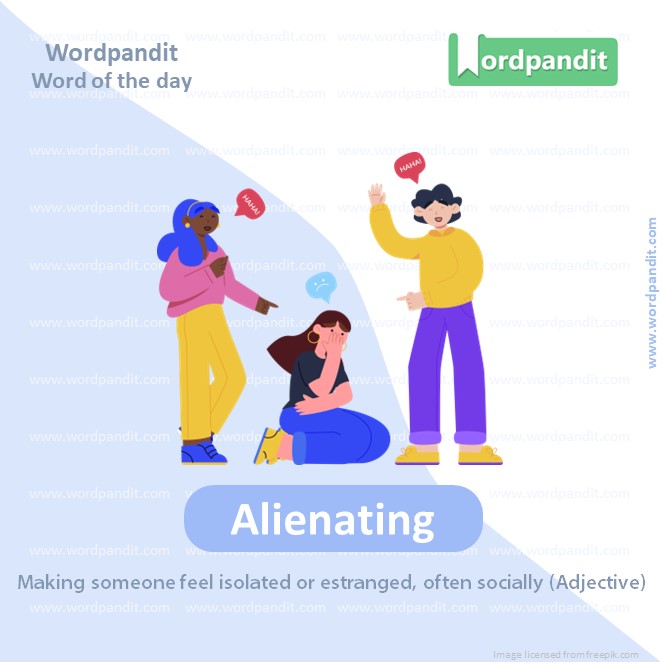
WORD-5: Alienating
CONTEXT: He can either double down on his Hindutva agenda, alienating ethnic and religious minorities, or build on India’s democratic and economic development to advance national reconciliation.
SOURCE: New York Times
EXPLANATORY PARAGRAPH: Imagine playing a game, but your friends don’t want you to join. When something is alienating, it means it’s making someone feel left out or different, like when people act in a way that pushes others away.
MEANING: Making someone feel isolated or estranged, often socially (Adjective).
PRONUNCIATION: AY-lee-uh-ney-ting
SYNONYMS: Isolating, Estranging, Marginalizing, Detaching, Separating, Dividing, Disaffecting.
USAGE EXAMPLES:
– The new policy had the unintended consequence of alienating loyal customers.
– His rude behavior was alienating potential friends.
– The exclusive club risked alienating those who wanted to join.
– The aggressive stance in the argument was alienating the team members.
WORD-6: conciliatory
CONTEXT: Mr. Modi’s legacy as an inclusive Indian leader and global statesman would be served through a more conciliatory approach.
SOURCE: New York Times
EXPLANATORY PARAGRAPH: Think about when you share your toys with a friend to make them happy. When something is conciliatory, it means it’s trying to make peace or make things better, like when you say sorry to a friend.
MEANING: Intended to make peace or reconcile differences (Adjective).
PRONUNCIATION: kuhn-SIL-ee-uh-tor-ee
SYNONYMS: Peacemaking, Reconciling, Appeasing, Mediating, Pacifying, Soothing, Harmonizing.
USAGE EXAMPLES:
– The manager made a conciliatory gesture to resolve the conflict in the team.
– The diplomat’s speech was conciliatory, promoting understanding between nations.
– After the argument, they exchanged conciliatory words to mend their friendship.
– The conciliatory approach helped ease tensions in the negotiation.
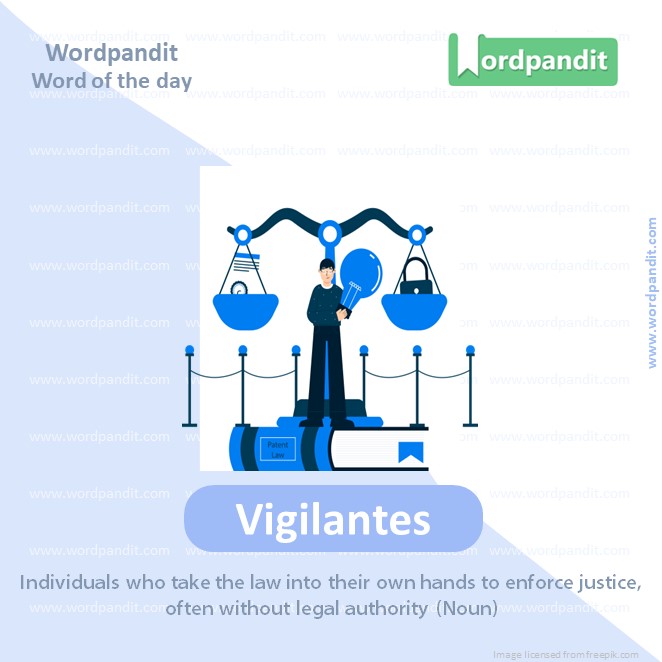
WORD-7: Vigilantes
CONTEXT: Reality TV has sensationalized the idea that bounty hunters are vigilantes and the individuals they seek are “bad guys.
SOURCE: New York Times
EXPLANATORY PARAGRAPH: Imagine a group of superheroes who aren’t in comics. Vigilantes are like that – regular people who take the law into their own hands to fight against crime or injustice, like neighborhood heroes.
MEANING: Individuals who take the law into their own hands to enforce justice, often without legal authority (Noun).
PRONUNCIATION: vi-jil-AN-tees
SYNONYMS: None (specific to individuals acting outside the law).
USAGE EXAMPLES:
– The town formed a group of vigilantes to tackle rising crime.
– The comic book depicted a group of vigilantes fighting corruption.
– Vigilantes patrolled the neighborhood to ensure safety.
– The actions of the vigilantes were controversial but gained community support.
WORD-8: Presumption
CONTEXT: Bounty hunters are instruments of a broken cash bail system that advantages the wealthy and undermines the presumption of innocence.
SOURCE: New York Times
EXPLANATORY PARAGRAPH: Imagine guessing what’s inside a wrapped gift. When something is a presumption, it means it’s a guess or an assumption made without clear evidence, like thinking it’s a toy when it could be a book.
MEANING: A guess or assumption made without clear evidence (Noun).
PRONUNCIATION: pri-ZUMP-shun
SYNONYMS: Assumption, Supposition, Presupposition, Hypothesis, Conjecture, Guess, Inference.
USAGE EXAMPLES:
– Making a presumption about someone’s feelings can lead to misunderstandings.
– The detective’s presumptions about the case turned out to be incorrect.
– She acted on the presumption that the meeting was canceled.
– Avoiding presumptions is essential for fair judgment.
WORD-9: Remediate
CONTEXT: About a dozen states and jurisdictions are curtailing or eliminating the use of cash bail, in part to remediate this failing system where wealth, not safety, determines who goes to jail and who walks free.
SOURCE: New York Times
EXPLANATORY PARAGRAPH: Imagine a superhero fixing a broken bridge. When something is remediated, it means it’s fixed or corrected, like when a grown-up helps you mend a torn toy.
MEANING: To fix, correct, or improve a problem or situation (Verb).
PRONUNCIATION: ri-MEE-dee-ate
SYNONYMS: Rectify, Resolve, Repair, Amend, Set right, Alleviate, Restore.
USAGE EXAMPLES:
– The company took immediate action to remediate the software bug.
– Efforts were made to remediate the environmental damage caused by the spill.
– The teacher worked to remediate the students’ understanding of the concept.
– The government implemented measures to remediate the economic downturn.
WORD-10: Genuflection
CONTEXT: a walking, talking tribute to, emulation of and genuflection before it.
SOURCE: New York Times
EXPLANATORY PARAGRAPH: Imagine someone bowing down in front of a king. Genuflection is like that – it’s when someone kneels or bows down as a sign of respect or worship, like when you show your manners.
MEANING: The act of kneeling or bowing down, especially as a sign of respect or worship (Noun).
PRONUNCIATION: jen-yuh-FLEK-shun
SYNONYMS: Bowing, Kneeling, Prostration, Obeisance, Reverence, Homage, Adoration.
USAGE EXAMPLES:
– The ceremony began with a genuflection before the sacred object.
– Genuflection is a common practice in many religious rituals.
– As a sign of respect, the knight performed a genuflection before the king.
– The tradition included a genuflection as a gesture of loyalty.
Vocabulary Hard Words
The experience of unraveling the depths of language learning often leads us to ‘vocabulary hard words’. These challenging jargons might seem daunting initially, but with the right learning strategies, the enigma of ‘vocabulary hard words’ can turn into an enticing quest. But how can these ‘vocabulary hard words’ be learned effectively?
Firstly, to master ‘vocabulary hard words’, it’s vital to break down the process into manageable steps. Instead of tackling several words at once, focus on understanding a few each day. This gradual approach ensures effective retention and understanding.
Multimedia resources tremendously aid in comprehending ‘vocabulary hard words’. Movies, podcasts, or even music in the target language contribute a comprehensive perspective. They provide real-life contexts and usages of ‘vocabulary hard words’, making them more understandable and less intimidating.
The incorporation of memory-enhancing techniques, such as flashcards or digital apps, can significantly bolster the retention of ‘vocabulary hard words’. Such tools encourage active recall, helping to cement these words into your long-term memory. Mnemonic devices can also aid in making these words more approachable by associating the hard words with relatable images or stories.
Practice is decisive when learning ‘vocabulary hard words’. Using these words in your conversations, written communications, or even social media posts will facilitate a robust understanding and recall.
Finally, do not worry about making mistakes while using ‘vocabulary hard words’. Mistakes are essential stepping stones in the learning process. They provide insights into areas that need more focus and help refine your grasp over these words.
In conclusion, grasping ‘vocabulary hard words’ is undoubtedly a challenging task but not an insurmountable one. With the aid of effective strategies including graded learning, multimedia resources, memory-enhancing tools, and regular practice, the process of mastering ‘vocabulary hard words’ can become an engaging and rewarding journey.











